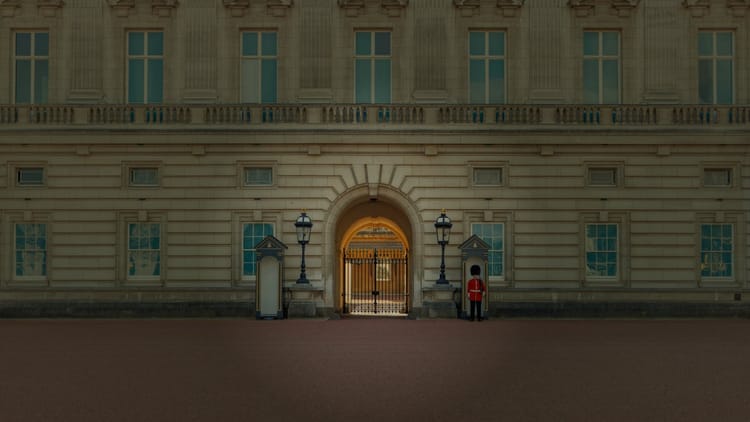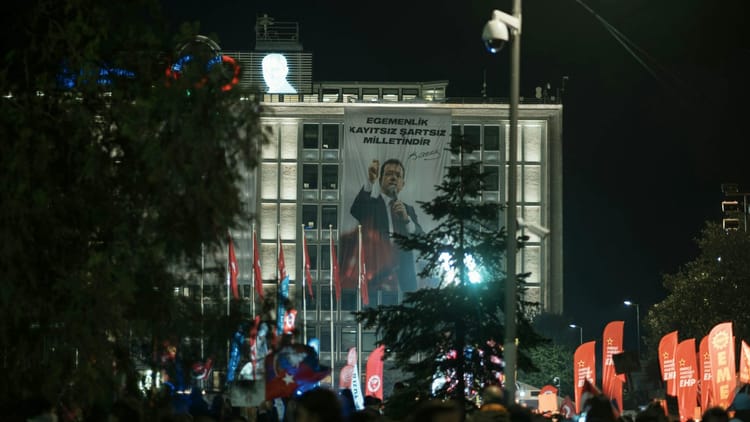Four days in Geneva

Recently: Why is Washington claiming a new legal authority to strike Venezuela—and sanctioning the International Criminal Court for issuing arrest warrants over Gaza? Yuan Yi Zhu on how democratic countries are responding to expansive rulings by international courts.
Today: What convinced the Ukrainians to accept a peace plan they’d rejected days earlier? The revised framework dropped points Kyiv wouldn’t accept—while Moscow says it hasn’t seen the changes.
+ For members: Does Putin’s vision of Russia as a great power make a peace deal with Ukraine impossible? Anatol Lieven on nationalist ambitions, historical narratives, and Moscow’s fraught relationship with the West.
& New music from Bill Callahan ...
Nineteen points
Ukraine’s President Volodymyr Zelenskyy stood before cameras last Thursday and described the American peace plan in stark terms. The 28-point proposal forced Ukraine to choose between the country’s dignity and an extremely difficult winter ahead. European leaders condemned the plan as capitulation to Russia. It would require Ukraine to cede territory permanently, abandon NATO ambitions, and limit its military. By Sunday night in Geneva, something had shifted. Ukraine’s top security official announced the delegations had reached “common understanding on the core terms.” Zelenskyy said the revised framework had fewer than 28 points and reflected “many proper considerations.” U.S. officials said Ukraine had agreed, with only “minor details” remaining. On Thursday, Ukraine called the plan unacceptable. By Sunday, they’d agreed to 19 points. What changed?
The revised plan removed provisions Ukraine considered red lines—strict army size limits and amnesty for wartime acts. But on Monday, the Kremlin said it hadn’t seen the updated version. Russia’s Foreign Minister Sergey Lavrov confirmed only that communication channels with Americans “are being used.” Russia had responded positively to the original 28-point plan. President Vladimir Putin told Türkiye’s President Recep Tayyip Erdoğan the initial version “could form the basis for a final peace settlement.” Whether Moscow accepts the changes Ukraine secured remains unclear. U.S. and Russian officials met in Abu Dhabi on Monday and Tuesday to discuss the framework. Neither disclosed details. The pattern suggests Ukraine won concessions in Geneva—the question is whether those concessions cross lines Russia won’t accept.

Meanwhile
- The diplomats and the drones. Russia launched 22 missiles and 460 drones on Kyiv overnight Monday, killing six people and damaging residential buildings and energy infrastructure. Ukraine responded with what a military commander called November’s most productive drone attack, striking the Russian port city of Novorossiysk. The exchanges came as U.S. Army Secretary Dan Driscoll met with Russian officials in Abu Dhabi on Tuesday to discuss the revised peace framework.
- Six lawmakers, six interviews. The U.S. Federal Bureau of Investigation requested interviews on Tuesday with six Democratic lawmakers who appeared in a video reminding service members they should disobey unlawful orders. The request followed Defense Secretary Pete Hegseth’s announcement of a Pentagon investigation into Senator Mark Kelly, a retired Navy captain. President Donald Trump called the lawmakers—five military veterans and one former CIA officer—"traitors" whose actions were potentially “punishable by DEATH.”
- Ten dead, no reason. Afghanistan’s Taliban government accused Pakistan of bombing a civilian home in Khost province early on Tuesday, killing nine children and one woman. Taliban spokesman Zabihullah Mujahid said Pakistani forces also struck Kunar and Paktika provinces, wounding four more. Pakistan’s military denied the strikes. The Taliban vowed to respond “at the appropriate time.” The accusations followed Monday’s attack on a security compound in Peshawar that killed three officers—an assault Pakistan has blamed on Afghan nationals.
- The ceasefire and the pattern. Sudan’s paramilitary Rapid Support Forces announced on Monday that they’d immediately enter a three-month humanitarian ceasefire, responding to U.S.-led mediation after President Trump said he’d intervene. The military head of the RSF, Hemedti, made the announcement one day after Sudan’s army chief rejected the same proposal. The RSF had accepted a ceasefire proposal earlier this month, then resumed drone strikes shortly afterward.
- Twenty-eight survivors. Amnesty International released a report on Monday documenting RSF war crimes in Darfur’s al-Fasher, based on interviews with 28 survivors who fled after the militia captured the city in October. Witnesses described executions of unarmed men, systematic sexual violence against women and girls, and hundreds of corpses in the streets. The report appeared hours after the RSF announced a humanitarian ceasefire. … See “The vanishing of al-Fasher.”

Speak a new language by New Year
Most Black Friday deals help you get more stuff. This one helps you get smarter. Babbel is offering 65% off a subscription that unlocks all 14 languages they teach—their best price of the year.
Lessons are short, practical, and built by language experts, so you can go from basic vocabulary to real conversations in weeks. A gift to yourself that sharpens your mind, expands your world, and actually fits into your day.
From the files
‘A betrayal within the family’
Does Putin’s vision of Russia as a great power make a peace deal with Ukraine impossible? Anatol Lieven on nationalist ambitions, historical narratives, and Moscow’s fraught relationship with the West.

Ukraine and the United States reached a “common understanding” in Geneva over the weekend on a revised peace framework. Whether the Kremlin will accept it depends on more than diplomatic language; it depends on whether Putin can accept any settlement Ukraine would have forced him to revise.
Early in the war, Anatol Lieven explored Putin’s view of Russia’s place in the world, why he sees Ukrainian independence as an affront to Russian civilization, and what the conflict’s outcome will mean for the vision that started it …
Your loyal guide to a changing world.
Membership with The Signal means exclusive access to premium benefits:
- Regular profiles on the questions behind the headlines
- In-depth feature interviews with our network of specialist contributors from across America and around the world
- The despatch, our weekly current-affairs and cultural-intelligence briefing
- Early access to new products, including print extras
It also means vital support for an independent new enterprise in current-affairs journalism.
New music
‘The Man I’m Supposed to Be’
The Texan singer-songwriter Bill Callahan returns with a meditation on getting older—and a little less satisfied with where he finds himself. “And now my biggest fear is not the dying / My biggest fear is that I’ll stop trying / To be the man I am supposed to be.” And the guitars here may do more even storytelling than Callahan.





